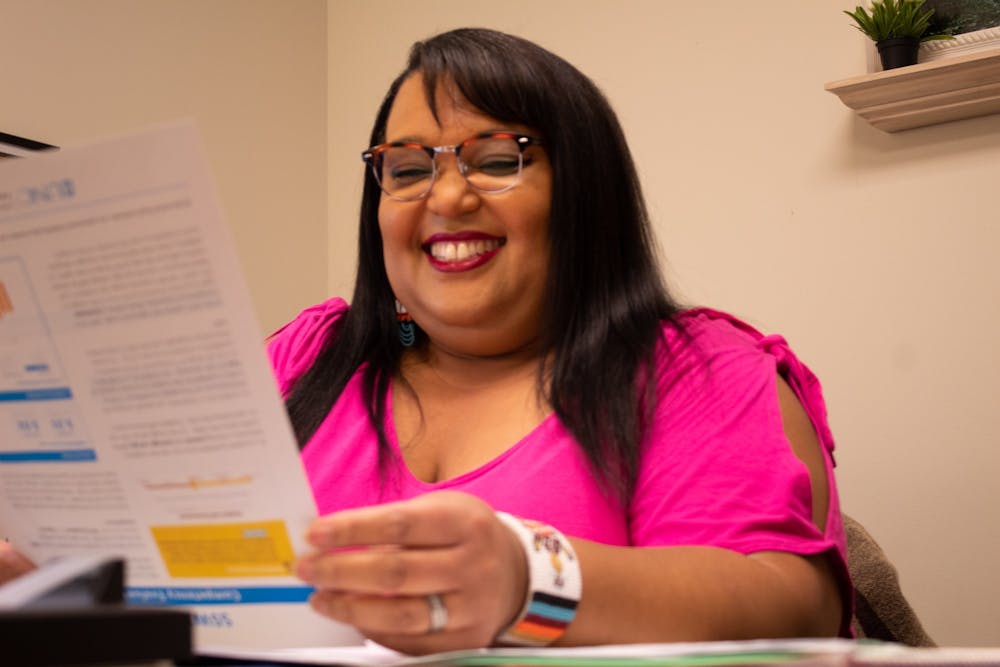She started her private practice in 2016 with the mission of supporting and treating women experiencing mental health disorders during and after pregnancy.
Parker said these disorders can include depression, anxiety, obsessive-compulsive disorder, post-traumatic stress disorder and psychosis. She said for many women, the pregnancy and postpartum experience isn’t always as joyous as it’s made to seem.
“There’s so much built around pregnancy and the desire to have children,” Parker said. “And it just doesn’t happen like in the movies for most people.”
Knowing this, Parker actively works to fight against the stigma surrounding perinatal and postpartum mood disorders. She said that women are often hesitant to voice their feelings for fear of being judged.
“In the private practice, the women that come to me come from all walks of life," Parker said. "I mean, we’re talking professionals, doctors, nurses, social workers, moms who work at home. There is no person that is exempt from maybe experiencing these perinatal mood anxiety disorders."
Beyond her private practice, Parker works to reduce the health disparities that exist for women of color. Parker, who is Black and descends from the Waccamaw Siouan Indian tribe in Columbus County, N.C., said she feels personally connected to the challenges women of color face in healthcare.
“One of the most disturbing disparities that exists and that has been brought to light over the last couple of years is the difference in the maternal mortality rate for African-American and Native American women, which is estimated to be about three to four times that of white women,” Parker said. “I think this exposes so many systemic issues involving, 'How are Black and Native women treated when they are in a health care setting? Are they being listened to? Are their concerns being addressed?'”
To bring awareness to these challenges, Parker began working as a professional adviser for the Moms Supporting Moms group in 2017. She said she had the opportunity to go to the United States Capitol and speak with representatives and senators about the importance of perinatal and postpartum treatment for women across the country.
“That was an amazing experience," Parker said. "That, to me, was advocacy at its best — it was empowering. We can feel like we’ve done everything we can when we actually reach out and participate in systems that were meant for us to do that.”
Diversity, equity and inclusion in the workplace
Throughout her career, Parker has always prioritized diversity and inclusion in the workplace, but in 2020 she was moved to take further action following the murder of George Floyd.
At the time, Parker said she was working at Central Regional Hospital, a state-run psychiatric hospital in Butner, North Carolina.
To get the day's news and headlines in your inbox each morning, sign up for our email newsletters.
That’s when she proposed the idea of a "Safe Space," held over two days in the hospital's cafeteria for people to process the events occurring at the time and mourn the loss of victims of police brutality.
In the months that followed, Parker led the Diversity and Inclusion Council at the hospital. As the head, she created monthly "Conversation Circles" where staff could have discussions about racism and inequity.
Dr. Tyehimba Hunt-Harrison, a child and adolescent psychiatrist who worked with Parker on the Diversity and Inclusion Council, said Parker has a strong ability to bring people together to discuss important issues regarding diversity and equity in the workplace.
“She made sure to include folks who worked in the cafeteria, nurses, line workers, workers, people who didn’t have any type of clinical direct patient care experience," Hunt-Harrison said. "She wanted to make sure that everyone was represented."
It was for these efforts that Parker was nominated for the John R. Larkins Award.
Dr. Mandy Cohen, secretary of the North Carolina Department of Health and Human Services, presented the award to Parker in January. She said that Parker’s work emulates the goals of Larkin’s.
“Dr. Larkin’s legacy is often referred to as one of hope and trust in hard work and about committing to a life of improving our communities, and I think that’s exactly what April embodies,” Cohen said. “She brings a life experience into the work that’s really critical, but uses her voice for leadership and her experience to create opportunities for workplaces where everyone feels that they belong.”
Back at Carolina
In August, Parker began work as a clinical assistant professor in the UNC School of Social Work. She said that her journey to UNC has always been a “winding river” — one that continued bringing her back to the University.
Parker will also continue her private practice. She said she hopes to use her experiences working toward diversity, equity and inclusion in different spaces to inspire students at UNC.
“I want these students to know that you can do anything," Parker said. "You can bring change to places that you never thought that you would bring change to. You can leave a lasting impression. You can fight for social justice. You can fight for inclusion and belonging."
@kelly2cats_
elevate@dailytarheel.com




